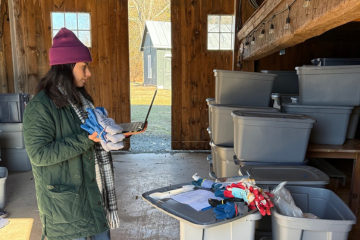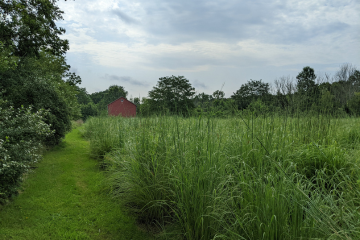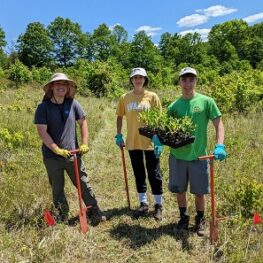
RHA Stewardship Manager Zak Kircher (left) with volunteers Maeve MacDonald and Gavin Beyers
The meadows at Raritan Headwaters Association’s Fairview Farm Wildlife Preserve in Bedminster, NJ, are getting a habitat boost with the planting of thousands of native milkweeds, the required larval food source for the endangered Monarch Butterfly. The Raritan Headwaters project, Milkweeds for Monarchs, kicked off in May 2023 with the planting of 500 swamp milkweed plugs in two of the meadows at the Preserve, impacting about 8.5 acres of meadow habitat. In June 2023, thousands of seeds of common milkweed and butterfly weed were planted as well. We hope this project will encourage others to plant milkweeds and other native pollinator plants to assist in the recovery of Monarch Butterfly populations.
Why milkweeds? The milky sap in the plants contains a chemical that makes the caterpillars taste bad to birds and other predators, thus helping them survive. The meadows at the Preserve host many other native flowering plants including goldenrods, asters, New York Ironweed, and mountain mint among others, which provide nectar for adult Monarchs and other butterflies but lacked milkweeds.
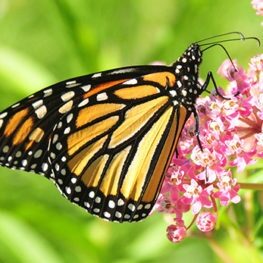 The once common eastern population of the Monarch Butterfly has declined by 80% over the past 3 decades and along with documented declines on their wintering grounds in Mexico has prompted the International Union for the Conservation of Nature (IUCN) to list it as Endangered. Monarchs face many hazards including those encountered along their 3,000-mile migration route spanning from Mexico to Canada. Monarchs are threatened by deforestation of wintering forests in Mexico, disruptions to their migration caused by climate change, the loss of native plants (including milkweed species but also all nectar-producing native plants) along their migratory corridors, and widespread use of insecticides on crops.
The once common eastern population of the Monarch Butterfly has declined by 80% over the past 3 decades and along with documented declines on their wintering grounds in Mexico has prompted the International Union for the Conservation of Nature (IUCN) to list it as Endangered. Monarchs face many hazards including those encountered along their 3,000-mile migration route spanning from Mexico to Canada. Monarchs are threatened by deforestation of wintering forests in Mexico, disruptions to their migration caused by climate change, the loss of native plants (including milkweed species but also all nectar-producing native plants) along their migratory corridors, and widespread use of insecticides on crops.
One may ask, “Why does the loss of the Monarch Butterfly species matter?” Aside from the obvious loss of their iconic beauty, they are part of a larger group of pollinator species that we rely upon for our food and for healthy ecosystems that provide clean air and water. It is estimated that worldwide about 75% of flowering plants and 35% of food crops rely on pollination by insects, birds or mammals. Insects are the most diverse group of animals on the planet and they play many ecological roles such as plant consumer as well as predator and prey. 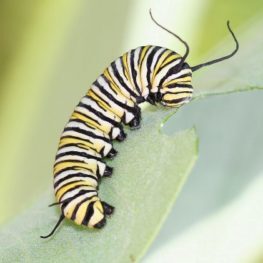 As awareness that a larger, global decline of insect abundance is underway (see the 2018 New York Times article) the need for action to avert greater losses has gained momentum. Several ways we can all help Monarchs and other pollinators around our own homes is to plant native wildflower species, including milkweeds (see a list of native species here); on larger properties replace lawn with wildflower meadow habitat; become an official ”Monarch Waystation”; stop using insecticides and herbicides on your lawns and gardens; and buy organic produce to support pesticide-free agriculture. Learn more about other ways you can help nature by visiting our Watershed Protector Hub.
As awareness that a larger, global decline of insect abundance is underway (see the 2018 New York Times article) the need for action to avert greater losses has gained momentum. Several ways we can all help Monarchs and other pollinators around our own homes is to plant native wildflower species, including milkweeds (see a list of native species here); on larger properties replace lawn with wildflower meadow habitat; become an official ”Monarch Waystation”; stop using insecticides and herbicides on your lawns and gardens; and buy organic produce to support pesticide-free agriculture. Learn more about other ways you can help nature by visiting our Watershed Protector Hub.
The Raritan Headwaters Milkweed for Monarchs project is funded through a Conservation Stewardship Program (CSP) grant from Natural Resource Conservation Service (NRCS), a federal program aimed at improving conservation practices on private land, including farms, and public open space like Fairview Farm Wildlife Preserve. If you are interested in learning more about milkweeds, meadows, and monarchs or wish to volunteer to assist RHA with stewardship on our properties, contact RHA Stewardship Manager Edward Whitehead at ewhitehead@raritanheadwaters.org.


